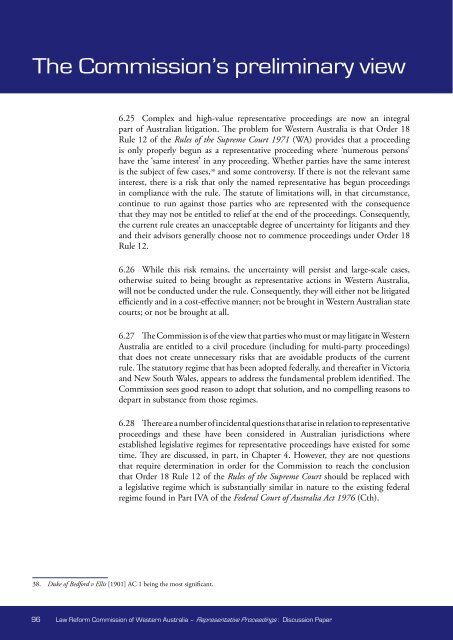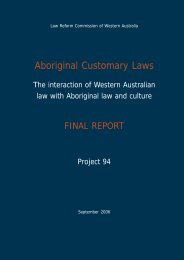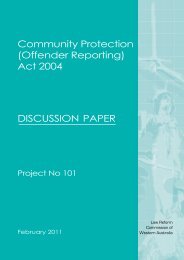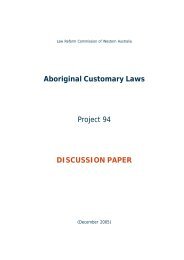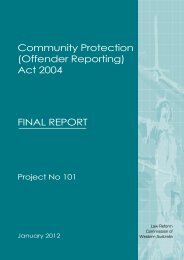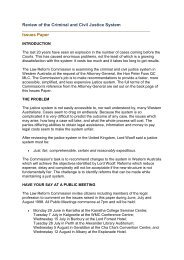Discussion Paper - Law Reform Commission of Western Australia
Discussion Paper - Law Reform Commission of Western Australia
Discussion Paper - Law Reform Commission of Western Australia
You also want an ePaper? Increase the reach of your titles
YUMPU automatically turns print PDFs into web optimized ePapers that Google loves.
The <strong>Commission</strong>’s preliminary view<br />
6.25 Complex and high-value representative proceedings are now an integral<br />
part <strong>of</strong> <strong>Australia</strong>n litigation. The problem for <strong>Western</strong> <strong>Australia</strong> is that Order 18<br />
Rule 12 <strong>of</strong> the Rules <strong>of</strong> the Supreme Court 1971 (WA) provides that a proceeding<br />
is only properly begun as a representative proceeding where ‘numerous persons’<br />
have the ‘same interest’ in any proceeding. Whether parties have the same interest<br />
is the subject <strong>of</strong> few cases, 38 and some controversy. If there is not the relevant same<br />
interest, there is a risk that only the named representative has begun proceedings<br />
in compliance with the rule. The statute <strong>of</strong> limitations will, in that circumstance,<br />
continue to run against those parties who are represented with the consequence<br />
that they may not be entitled to relief at the end <strong>of</strong> the proceedings. Consequently,<br />
the current rule creates an unacceptable degree <strong>of</strong> uncertainty for litigants and they<br />
and their advisors generally choose not to commence proceedings under Order 18<br />
Rule 12.<br />
6.26 While this risk remains, the uncertainty will persist and large-scale cases,<br />
otherwise suited to being brought as representative actions in <strong>Western</strong> <strong>Australia</strong>,<br />
will not be conducted under the rule. Consequently, they will either not be litigated<br />
efficiently and in a cost-effective manner; not be brought in <strong>Western</strong> <strong>Australia</strong>n state<br />
courts; or not be brought at all.<br />
6.27 The <strong>Commission</strong> is <strong>of</strong> the view that parties who must or may litigate in <strong>Western</strong><br />
<strong>Australia</strong> are entitled to a civil procedure (including for multi-party proceedings)<br />
that does not create unnecessary risks that are avoidable products <strong>of</strong> the current<br />
rule. The statutory regime that has been adopted federally, and thereafter in Victoria<br />
and New South Wales, appears to address the fundamental problem identified. The<br />
<strong>Commission</strong> sees good reason to adopt that solution, and no compelling reasons to<br />
depart in substance from those regimes.<br />
6.28 There are a number <strong>of</strong> incidental questions that arise in relation to representative<br />
proceedings and these have been considered in <strong>Australia</strong>n jurisdictions where<br />
established legislative regimes for representative proceedings have existed for some<br />
time. They are discussed, in part, in Chapter 4. However, they are not questions<br />
that require determination in order for the <strong>Commission</strong> to reach the conclusion<br />
that Order 18 Rule 12 <strong>of</strong> the Rules <strong>of</strong> the Supreme Court should be replaced with<br />
a legislative regime which is substantially similar in nature to the existing federal<br />
regime found in Part IVA <strong>of</strong> the Federal Court <strong>of</strong> <strong>Australia</strong> Act 1976 (Cth).<br />
38. Duke <strong>of</strong> Bedford v Ellis [1901] AC 1 being the most significant.<br />
96 <strong>Law</strong> <strong>Reform</strong> <strong>Commission</strong> <strong>of</strong> <strong>Western</strong> <strong>Australia</strong> – Representative Proceedings : <strong>Discussion</strong> <strong>Paper</strong>


